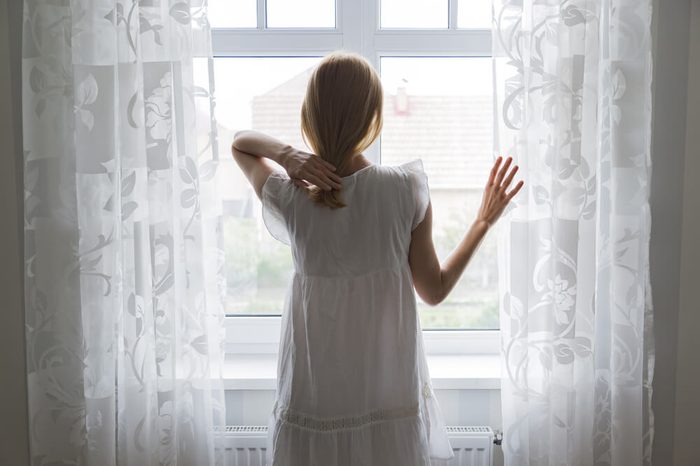Recognizing depression
According to the National Institutes of Health, depression is most likely the result of a combination of biological, genetic, psychological, and social factors. “We don’t really know what causes depression,” says Victor Schwartz, MD, chief medical officer for the JED Foundation, a New York City based nonprofit that works to protect teen and young adult emotional health. For many people, the episodes stem from a loss or a disturbing life change, he says. Certain medical conditions such as an underactive thyroid, cancer, and heart disease may also trigger depression. So too, can hormonal imbalances that happen after childbirth and during menopause. “Medications such as sedatives, sleeping pills, and high blood pressure medication can also precipitate depression symptoms,” Dr. Schwartz says.

Diagnosing depression
Peter Economou, PhD, a cognitive behavioral therapy specialist and director at the Counseling and Wellness Center based in New York and New Jersey, says that diagnosing depression isn’t easy. “It’s not like a strep test—there is no positive or negative result with mental health because there are an infinite number of variables that can contribute to depression.” To diagnose clinical depression, many doctors refer to the symptom criteria in the Diagnostic and Statistical Manual of Mental Disorders (DSM-5), published by the American Psychiatric Association.

An overwhelming feeling of sadness
Feeling sad is an emotion that is part of everyday life. But if it lasts more than two weeks and others are noticing your mood change, it may be time to consider whether you might have depression. If you’re not sure, here’s a way to determine the difference between clinical depression and everyday sadness. A good rule of thumb, according to Dr. Schwartz, is to recognize if you’re handling sadness in a way that’s different from your past reactions to the emotion. For example, if you turn to substance or alcohol abuse, that may be an indication that you’re depressed and not merely sad. If sadness is interfering with the way a person lives their life, it may call for a medical evaluation, he says. A medical professional can help determine if therapy or medication might help you, or recommend other lifestyle changes that may help such as diet, exercise, or more socialization.

Diminished interest or pleasure in activities
Depression can also involve a loss of interest in previously-rewarding or enjoyable activities. If you no longer find social interactions pleasurable or shun physical things like food or touching, it could signal a low mood. Psychotherapy, depression medication, or other treatments may help you feel back to yourself. But there’s more to it than diminished interest in activities; check out these depression facts psychologists wish people knew.

Significant weight changes
A 2016 meta-analysis of adolescents published in the journal PLOS ONE concluded that there was an association between depression and obesity. It’s not uncommon for depressed people to find comfort in food and overeat. On the other hand, some depressed individuals lack the energy to eat in the first place. As a result, they lose weight. And when they feel better, they may eat more. Consider exercise, too. The research indicates that exercise is one of the most effective treatments for mild and moderate depression, says Dr. Economou.

Insomnia or hypersomnia
Sleep disturbance is a core symptom of clinical depression; the National Sleep Foundation states that insomnia is common among depressed individuals. “About 95 percent of my patients—whether they have depression or not—have sleep problems,” says Dr. Economou. “Often, people begin to negatively relate to sleep and condition themselves to dread going to bed.” However, not all people with depression have insomnia, many actually sleep for longer, not shorter, periods of time. Cognitive behavioral therapy, sleep aids, and depression medication, may help alleviate sleep-related problems. And the Centers for Disease Control recommends that people try to increase exercise and avoid caffeine, alcohol, and electronic devices before bedtime for better sleep.

Feeling restless
Think about how much your restless feelings may be interfering with your ability to work and relate to others, advises Dr. Schwartz. He suggests asking yourself if these feelings disturb sleep or concentration. Agitation is often associated with clinical depression; when it’s severe, you may be diagnosed with agitated depression. If you can’t shake a constant sense of restlessness or irritation, Dr. Schwartz recommends starting with cognitive behavioral therapy.

Fatigue or loss of energy
The American Psychiatric Association notes that “loss of energy or increased fatigue” is one of many depression symptoms. Fatigue can detract from your performance at school or work. It can also interfere with your social relationships. Treating depression may help combat fatigue and other symptoms. Therapy, stress management tools, and support from other people may help, as can good sleep hygiene, healthy diet, daily exercise, and spending time outdoors. Be sure to be aware of these everyday habits that up your risk for depression.

Feelings of worthlessness
Feelings of worthlessness and hopelessness are common for people with depression. “The cause for these feelings could be the result of a life event, but what I see the most is that the feeling is the result of chronic exposure to stress,” Dr. Economou says. He explains that these feelings linger over time. Therefore, they may become overwhelming and it becomes a stigma. This is how your medication could be making you depressed.

Difficulty concentrating or indecisiveness
A loss of confidence can make decisions difficult: If you don’t trust yourself, how can you choose the right option? Therefore, continually battling self-doubt will also interfere with your concentration, according to Dr. Economou. If it’s hard to concentrate, which the World Health Organization (WHO) says is typical in repeated depressive episodes, your doctor might recommend a combination of psychotherapy and depression medication. This is how to tell the difference between depression and anxiety.

Thoughts of death or suicidal intentions
According to the Jed Foundation, people who struggle with depressive disorders are at increased risk of having suicidal thoughts or impulses for suicide. Therefore, it’s beneficial to know these 13 suicide warning signs. Some common signs of suicidal thoughts and behavior include talking about ending one’s life, withdrawal, changes in substance abuse, and giving away personal possessions. If you have such feelings, contact the National Suicide Prevention Lifeline: 1-800-273-8255.

Hallucinations
When people start hallucinating (seeing or hearing things) or become delusional, their diagnosis could be psychotic depression, a combination of depression and psychosis. Psychotic depression is the severe end of the depression spectrum, says Dr. Schwartz. “People with this condition are at a fairly high risk of suicide or of doing something harmful because they are driven by delusion—they need to be treated with antidepressant and anti-psychotic medications.”

Treating depression
The use of depression medication has increased dramatically over time. For example, the Centers for Disease Control and Prevention notes that in depressed people assessed from 2011-2014, “one-fourth of persons who took antidepressant medication had done so for 10 years or more.” Additionally, Dr. Schwartz says that antidepressant medication has improved over the years. In other words, many now have more tolerable side effects. Today, SSRIs (selective serotonin reuptake inhibitors) are the most commonly prescribed type of antidepressants. SNRIs (serotonin and norepinephrine reuptake inhibitors) are also in use. Many people may be able to come off their antidepressants when they’ve been feeling better for at least a year. Talk to your doctor to see if this is an option and don’t stop taking medications without having this conversation. Check out these 16 science-backed ways to help overcome depression naturally.

